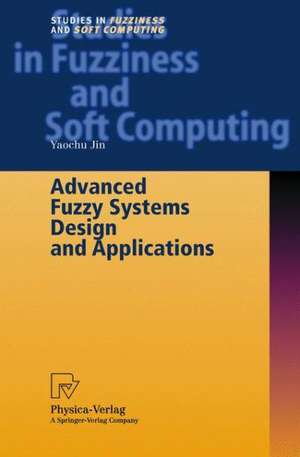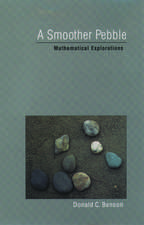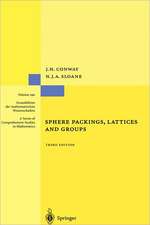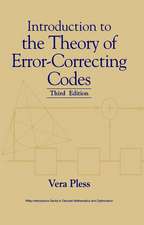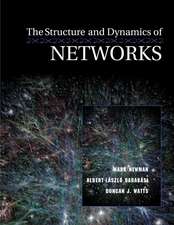Advanced Fuzzy Systems Design and Applications: Studies in Fuzziness and Soft Computing, cartea 112
Autor Yaochu Jinen Limba Engleză Paperback – 12 dec 2011
| Toate formatele și edițiile | Preț | Express |
|---|---|---|
| Paperback (1) | 633.94 lei 6-8 săpt. | |
| Physica-Verlag HD – 12 dec 2011 | 633.94 lei 6-8 săpt. | |
| Hardback (1) | 635.55 lei 6-8 săpt. | |
| Physica-Verlag HD – 18 noi 2002 | 635.55 lei 6-8 săpt. |
Din seria Studies in Fuzziness and Soft Computing
- 20%
 Preț: 982.99 lei
Preț: 982.99 lei - 20%
 Preț: 642.05 lei
Preț: 642.05 lei - 20%
 Preț: 284.42 lei
Preț: 284.42 lei - 20%
 Preț: 872.96 lei
Preț: 872.96 lei - 20%
 Preț: 914.87 lei
Preț: 914.87 lei - 20%
 Preț: 1033.25 lei
Preț: 1033.25 lei - 20%
 Preț: 975.69 lei
Preț: 975.69 lei - 20%
 Preț: 984.96 lei
Preț: 984.96 lei - 18%
 Preț: 938.04 lei
Preț: 938.04 lei - 20%
 Preț: 324.56 lei
Preț: 324.56 lei - 20%
 Preț: 327.45 lei
Preț: 327.45 lei - 20%
 Preț: 980.73 lei
Preț: 980.73 lei -
 Preț: 385.06 lei
Preț: 385.06 lei - 20%
 Preț: 636.88 lei
Preț: 636.88 lei - 20%
 Preț: 969.37 lei
Preț: 969.37 lei - 18%
 Preț: 942.39 lei
Preț: 942.39 lei - 20%
 Preț: 979.59 lei
Preț: 979.59 lei - 20%
 Preț: 982.49 lei
Preț: 982.49 lei - 15%
 Preț: 635.55 lei
Preț: 635.55 lei - 20%
 Preț: 640.59 lei
Preț: 640.59 lei - 20%
 Preț: 981.06 lei
Preț: 981.06 lei - 15%
 Preț: 630.23 lei
Preț: 630.23 lei - 20%
 Preț: 992.70 lei
Preț: 992.70 lei - 20%
 Preț: 975.87 lei
Preț: 975.87 lei -
 Preț: 382.22 lei
Preț: 382.22 lei - 18%
 Preț: 1202.76 lei
Preț: 1202.76 lei - 20%
 Preț: 640.46 lei
Preț: 640.46 lei - 18%
 Preț: 935.55 lei
Preț: 935.55 lei - 18%
 Preț: 932.61 lei
Preț: 932.61 lei
Preț: 633.94 lei
Preț vechi: 792.42 lei
-20% Nou
Puncte Express: 951
Preț estimativ în valută:
121.36€ • 126.15$ • 100.62£
121.36€ • 126.15$ • 100.62£
Carte tipărită la comandă
Livrare economică 07-21 februarie 25
Preluare comenzi: 021 569.72.76
Specificații
ISBN-13: 9783790825206
ISBN-10: 3790825204
Pagini: 284
Ilustrații: X, 272 p. 228 illus.
Dimensiuni: 155 x 235 x 15 mm
Greutate: 0.4 kg
Ediția:Softcover reprint of the original 1st ed. 2003
Editura: Physica-Verlag HD
Colecția Physica
Seria Studies in Fuzziness and Soft Computing
Locul publicării:Heidelberg, Germany
ISBN-10: 3790825204
Pagini: 284
Ilustrații: X, 272 p. 228 illus.
Dimensiuni: 155 x 235 x 15 mm
Greutate: 0.4 kg
Ediția:Softcover reprint of the original 1st ed. 2003
Editura: Physica-Verlag HD
Colecția Physica
Seria Studies in Fuzziness and Soft Computing
Locul publicării:Heidelberg, Germany
Public țintă
ResearchCuprins
1. Fuzzy Sets and Fuzzy Systems.- 1.1 Basics of Fuzzy Sets.- 1.2 Fuzzy Rule Systems.- 1.3 Interpretability of Fuzzy Rule System.- 1.4 Knowledge Processing with Fuzzy Logic.- 2. Evolutionary Algorithms.- 2.1 Introduction.- 2.2 Generic Evolutionary Algorithms.- 2.3 Adaptation and Self-Adaptation in Evolutionary Algorithms.- 2.4 Constraints Handling.- 2.5 Multi-objective Evolution.- 2.6 Evolution with Uncertain Fitness Functions.- 2.7 Parallel Implementations.- 2.8 Summary.- 3. Artificial Neural Networks.- 3.1 Introduction.- 3.2 Feedforward Neural Network Models.- 3.3 Learning Algorithms.- 3.4 Improvement of Generalization.- 3.5 Rule Extraction from Neural Networks.- 3.6 Interaction between Evolution and Learning.- 3.7 Summary.- 4. Conventional Data-driven Fuzzy Systems Design.- 4.1 Introduction.- 4.2 Fuzzy Inference Based Method.- 4.3 Wang-Mendel’s Method.- 4.4 A Direct Method.- 4.5 An Adaptive Fuzzy Optimal Controller.- 4.6 Summary.- 5.Neural Network Based Fuzzy Systems Design.- 5.1 Neurofuzzy Systems.- 5.2 The Pi-sigma Neurofuzzy Model.- 5.3 Modeling and Control Using the Neurofuzzy System.- 5.4 Neurofuzzy Control of Nonlinear Systems.- 5.5 Summary.- 6. Evolutionary Design of Fuzzy Systems.- 6.1 Introduction.- 6.2 Evolutionary Design of Flexible Structured Fuzzy Controller..- 6.3 Evolutionary Optimization of Fuzzy Rules.- 6.4 Fuzzy Systems Design for High-Dimensional Systems.- 6.5 Summary.- 7. Knowledge Discovery by Extracting Interpretable Fuzzy Rules.- 7.1 Introduction.- 7.2 Evolutionary Interpretable Fuzzy Rule Generation.- 7.3 Interactive Co-evolution for Fuzzy Rule Extraction.- 7.4 Fuzzy Rule Extraction from RBF Networks.- 7.5 Summary.- 8. Fuzzy Knowledge Incorporation into Neural Networks.- 8.1 Data and A Priori Knowledge.- 8.2 Knowledge Incorporation in NeuralNetworks for Control.- 8.3 Fuzzy Knowledge Incorporation By Regularization.- 8.4 Fuzzy Knowledge as A Related Task in Learning.- 8.5 Simulation Studies.- 8.6 Summary.- 9. Fuzzy Preferences Incorporation into Multi-objective Optimization.- 9.1 Multi-objective Optimization and Preferences Handling.- 9.2 Evolutionary Dynamic Weighted Aggregation.- 9.3 Fuzzy Preferences Incorporation in MOO.- 9.4 Summary.- References.
Caracteristici
Includes supplementary material: sn.pub/extras
